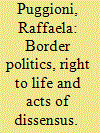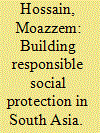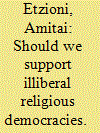| Srl | Item |
| 1 |
ID:
139770


|
|
|
|
|
| Summary/Abstract |
The debate on migration-related border controls has greatly expanded during the past decade. Special attention has been given to processes of contestation and of rights-claims enacted by migrants, drawing greatly on Isin’s work on acts of citizenship and Rancière’s articulation of the ‘uncounted’ and the political. Within this broad debate little attention has been devoted to the acts of common people in contesting current border management and especially in refusing the policing and the bordering of their own territory. By focusing on the Lampedusa borderland, this paper will explore and interrogate the verbal protests made by the people of Lampedusa in response to the drowning of some 366 African migrants on 3 October 2013. The protests were mostly against current border patrolling and its politics of (non-)life, which prioritise border protection against (migrants’) life protection. The call to protecting all human life, equally worthy of being protected, transformed these protests into political acts. Using and extending the work of Rancière, I explore the extent to which the people of Lampedusa have highlighted a ‘wrong’ and enacted ‘dissensus’ by contesting the (natural) securitised order of EU border management.
|
|
|
|
|
|
|
|
|
|
|
|
|
|
|
|
| 2 |
ID:
132912


|
|
|
|
|
| Publication |
2014.
|
| Summary/Abstract |
inspired by the global ambition to eradicate poverty through the Millennium Development Goals, to be achieved by 2015, this article finds that continuing population growth in South Asia will make such goals impossible to achieve. Rather than sinking into despair, however, the article first captures specifically the major demographic reasons behind the troubling bottlenecks of development in South Asia. Since tackling those demographic issues will not yield tangible results in the short run, the focus of analysis then switches to arguing that other creative development remedies are indeed feasible. Given that there is no scarcity of food in South Asia, but it simply does not reach those who need it most, the article demonstrates that India's recent Food Security Act of 2013 may be a globally relevant model of concerted state action to tackle deep poverty and avoid mass starvation. This article breaks new ground in relation to implementing state-led social welfare measures, showing that earlier assessments about Asian development may have been too pessimistic.
|
|
|
|
|
|
|
|
|
|
|
|
|
|
|
|
| 3 |
ID:
108314


|
|
|
|
|
| Publication |
2011.
|
| Summary/Abstract |
The terms on which the US will agree to settle the conflict in Afghanistan reflect a much greater issue that the US faces in the Middle East: will it support only those who seek to establish democratic regimes that also respect individual, or ally itself with the often much more powerful groups that may be democratic, but are likely to foster regimes based on Shari'a law? At the very least, the West should urge all to respect the right to life, call on regimes to negotiate with protesters rather than machine-gunning them, and insist that protesters follow the Egyptian and Tunisian model of peaceful uprising. Beyond such liberal basics, it is best to let each nation work out its own regime. As a matter of policy, in order to support democratic groups and evolving democratic regimes in the Middle East, western governments had best be prepared to ally themselves with political forces whose liberal credentials, one must recognise, are evolving but not yet particularly high.
|
|
|
|
|
|
|
|
|
|
|
|
|
|
|
|